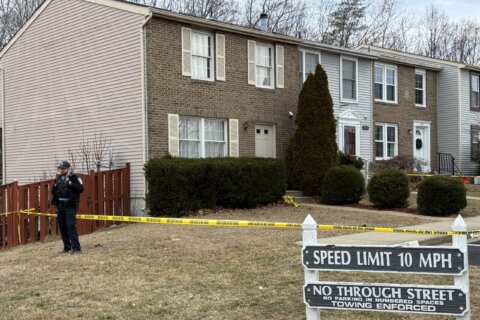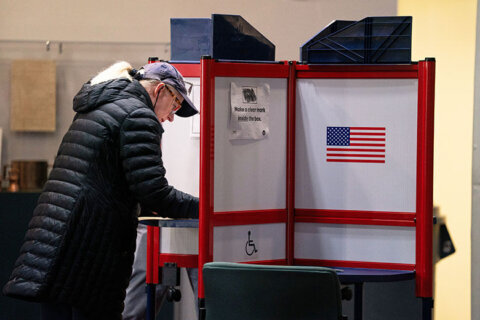In the midst of a 27-year high for measles cases in the U.S., health officials in Northern Virginia are warning people that that they may have been exposed to a person with measles.
The individual visited multiple locations this past weekend.
Here are the dates, times and places, according to the Virginia Department of Health:
- Dulles International Airport in Terminal A and Baggage Claim level on Sunday, June 2, from 5:30 p.m. to 8:30 p.m.
- Novant Health UVA Health System Haymarket Medical Center, 15225 Heathcote Boulevard, Haymarket, Virginia, in the emergency department on Sunday, June 2 at 11 p.m. through early Monday, June 3 at 4:30 a.m.
- Inova Fair Oaks Hospital, 600 Joseph Siewick Drive, Fairfax, Virginia, in the emergency department, including the waiting area, on Tuesday, June 4 from 3 p.m. to 5:30 p.m.
What the VDH says to do if you were at one of the above locations at the times specified:
- If you have received two doses of a measles vaccine (either the measles, mumps and rubella [MMR] vaccine or a measles only vaccine which is available in other countries), you are protected and do not need to take any action.
- If you have received only one dose of a measles vaccine, you are very likely to be protected and your risk of being infected with measles from any of these exposures is very low. However, to achieve complete immunity, contact your health care provider about getting a second vaccine dose.
- If you have never received a measles vaccine nor had a documented case of measles, you may be at risk of getting measles from this exposure. Contact your local health department or health care provider for advice on possible intervention to decrease your risk of becoming infected or other precautions you need to take. If you notice the symptoms of measles, stay home and away from others and immediately call your primary health care provider or health department to discuss further care. Call ahead before going to the office or the emergency room and tell them that you were exposed to measles.
Get more information about the measles on the Virginia Health Department website.
The measles virus is ferociously contagious. It lives in the mucus of a person’s nose and throat, and can be spread through coughing and sneezing. It can also survive in the air for two hours.
It’s so contagious that the CDC says if just one person in a room has it, 90% of those near that person will be infected if they’re not immune.
Measles cases have spiked this year in the U.S. A decade ago, there were less than 100 measles cases a year. Now, just six months into 2019, the Centers for Disease Control and Prevention report there are nearly 1,000. That’s the highest tally since 1992.
Number of measles cases reported by year
From Jan. 1 to May 31, 2019, 981** individual cases of measles have been confirmed in 26 states. This is an increase of 41 cases from the previous week. This is the greatest number of cases reported in the U.S. since 1992 and since measles was declared eliminated in 2000.
Case count is preliminary and subject to change. Data are updated every Monday. (Charts and data courtesy of the CDC)
Dr. Anthony Fauci, director of the National Institute for Allergies and Infectious Diseases, recently told WTOP that health officials find the lack of vaccinations “disturbing.”
And those who are most vulnerable are babies too young to get vaccinated.
“That’s the problem. … You generally get children vaccinated between 12 and 15 months for the first shot, and then the second shot at 4 to 6 years,” Fauci told WTOP.
“When you are in a very vulnerable area — either traveling internationally or living in one of the outbreak areas — you can vaccinate the child as early as 6 months to 11 to 12 months. But you only do that if you’re in an area where there is an outbreak.”
Before that, though, children remain at risk.
“That’s why it’s so disturbing to us in public health, where we see” less importance put on vaccines, Fauci said. “Which is really gauged not only to protect the individuals, but also to protect the vulnerables, like the children who cannot yet get vaccinated because of their age.”
Adults can also simply go and get a vaccine, even if you’ve been vaccinated before.
“In general, you try to figure out if you were vaccinated with the full component. If you have not and you’re concerned about it, there’s no harm in getting another shot,” Fauci said.
States with reported measles cases
2019 ** (as of May 31, 2019)
(Map and data courtesy of the CDC)
Measles in the U.S.
The worst year for measles in modern U.S. history was 1958, with more than 763,000 reported cases and 552 deaths. The numbers fell dramatically after a vaccine became available in the 1960s, and by the 1983, the annual case count dipped below 1,500.
But the illness rebounded at the end of the 1980s, with many cases among young unvaccinated black and Hispanic children living in inner-city areas.
In 1990, more than 27,000 cases were reported, including about 90 deaths.
During the resurgence, public health officials began recommending children get two vaccine doses, instead of one. Cases began to drop, and they plummeted after the 1993 creation of a federal program providing vaccines to children whose parents or guardians can’t afford them.
Will this year’s measles cases reach the levels seen in the early 1990s? There are several reasons the answer may be no.
Overall, vaccination levels are higher nationally today.
Also, measles cases historically peak in the spring for some unknown reason. Maybe that pattern will hold this year, too.
But experts have been surprised by the current epidemic, and say some recent developments make it hard to predict.
Some point to a social media-driven anti-vaccine movement that has been a major factor in the Brooklyn outbreak.








